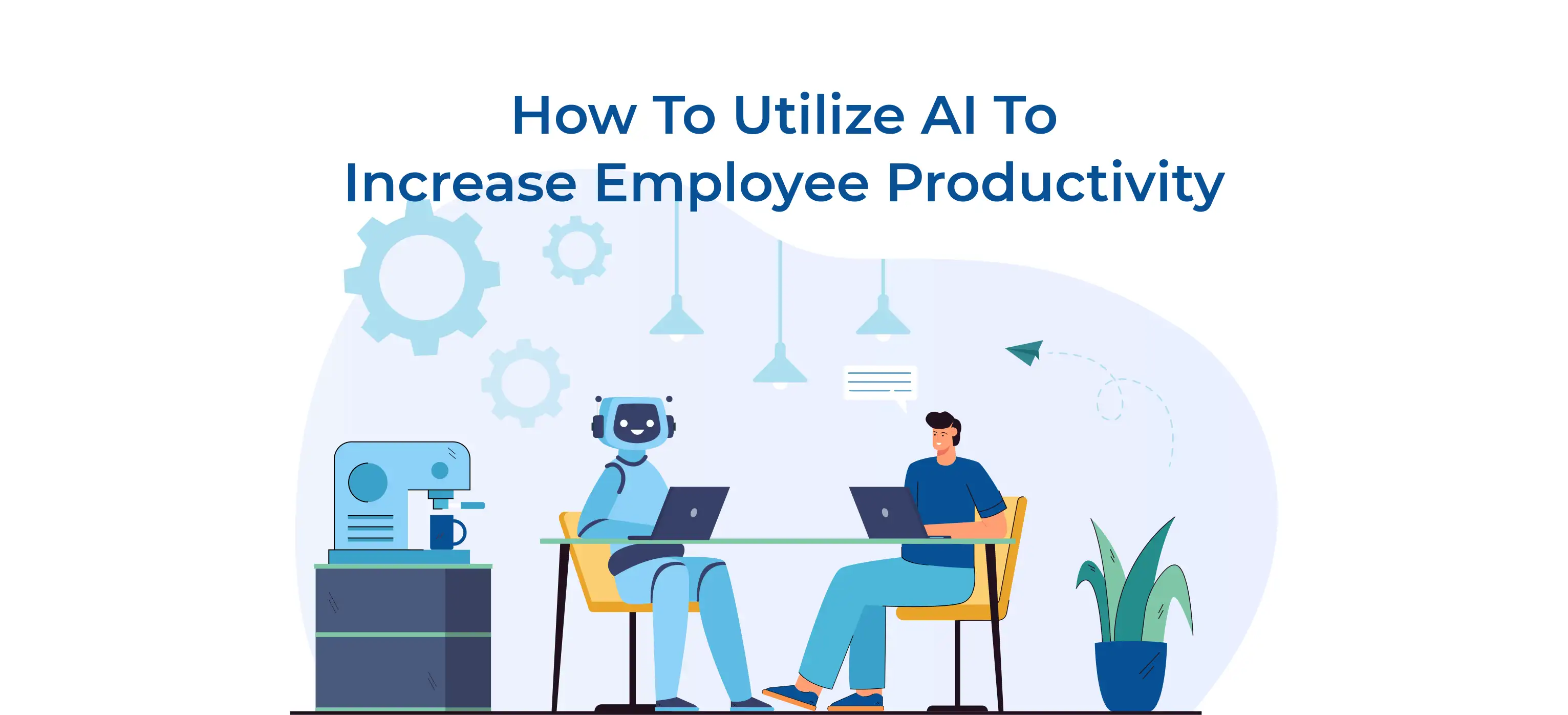 Jothi Kumar
Dec 05, 2024
Jothi Kumar
Dec 05, 2024

In today's fast-paced business environment, employee productivity is an essential part of the success of organizations. As technology advances, one powerful tool stands out, Artificial Intelligence (AI). AI has the potential to revolutionize the way we work and help us achieve higher levels of efficiency and effectiveness.
This blog will explore how AI can be harnessed to enhance employee productivity. From automating repetitive tasks to facilitating decision-making and skills development, AI offers many opportunities to transform the workplace and drive sustainable growth.
Artificial Intelligence (AI) encompasses a range of technologies that simulate human intelligence and learning capabilities. Organizations can unlock numerous benefits to increase employee productivity and drive business growth by understanding AI and harnessing its potential.
Check out: Industries That Will Be Most Affected By AI
Check out: How AI Will Impact The Future Of Work And Life?
Repetitive tasks are ubiquitous in numerous jobs, often consuming valuable time and effort that could be better allocated to more strategic and complex endeavors. Fortunately, Artificial Intelligence (AI) provides a compelling solution to tackle the challenges associated with repetitive tasks.
Repetitive tasks are notorious for their time-consuming and monotonous nature, hampering productivity and increasing the risk of employee burnout. These tasks frequently entail data entry, report generation, and other administrative duties that can be automated, thereby liberating precious resources.
The advent of AI technology has the potential to revolutionize how organizations approach repetitive tasks by automating them swiftly and accurately. AI systems can comprehend, interpret, and execute tasks previously performed manually by harnessing the power of machine learning algorithms and language processing capabilities.
Many AI-powered tools have emerged to streamline administrative tasks across various industries. These tools can handle data entry, document management, email filtering, and scheduling. For instance, virtual assistants equipped with AI capabilities can effectively manage calendars, prioritize emails, and even draft responses, significantly reducing the time and effort expended on administrative work.
Check out: How AI Is Helping To Identify Skills Gaps
Leveraging advanced data analysis and insights, Artificial Intelligence (AI) plays a crucial role in transforming decision-making processes, enabling organizations to make informed choices and gain a competitive advantage.
With AI algorithms, organizations can analyze large data volumes rapidly and accurately. These algorithms identify patterns, trends, and correlations within the data, allowing for predictive modeling and forecasting based on historical information.
Read Also : Top Artificial Intelligence Training Institutes in London
AI algorithms process complex data sets, generating actionable insights that improve decision-making processes. AI-powered decision support systems assist in evaluating multiple scenarios and options, enhancing accuracy while minimizing human bias.
AI-powered chatbots utilize data analysis to provide customer service recommendations. Financial institutions employ AI algorithms for fraud detection and risk assessment. In healthcare, AI-driven predictive analytics tools aid professionals in diagnosing and treating diseases.
Check out: What is Generative AI And How Does it Work
AI revolutionizes skills development and training, offers personalized learning experiences, identifies skill gaps, and fosters continuous professional growth. By harnessing the capabilities of AI, organizations can optimize their learning initiatives and equip employees with the essential skills needed to thrive in today's rapidly evolving work environment.
AI-based platforms provide tailored learning experiences that cater to individual needs and preferences. Adaptive algorithms continually assess learner progress and adjust content accordingly. Personalized feedback and recommendations enhance knowledge retention and engagement, ensuring a more effective learning experience.
AI algorithms analyze employee skills, identifying areas that require improvement. Customized training recommendations are provided based on these skill gaps and individual career aspirations. AI-driven insights help organizations align training programs with business objectives, ensuring targeted skill development.
AI facilitates on-demand access to relevant learning resources and content, enabling professionals to acquire knowledge when needed. Continuous assessment and feedback loops support ongoing skill enhancement, allowing individuals to improve their capabilities continually. AI-powered coaching and mentoring systems provide personalized guidance, fostering individualized growth and development.
Check out: Jobs Lost To Automation Statistics
Implementing Artificial Intelligence (AI) in the workplace can present challenges, but organizations can overcome them by addressing concerns and implementing effective strategies, ultimately reaping the benefits of AI integration.
To foster acceptance and overcome resistance, organizations must proactively address concerns related to job displacement, data security, and ethical considerations. Open communication channels, transparency in AI implementation, and employee education initiatives can help alleviate fears and build trust in AI technologies.
Successful AI implementation requires careful planning, collaboration, and clearly defined goals. Organizations should assess their specific needs, invest in appropriate AI technologies, and ensure proper training for employees to maximize the potential of AI. Additionally, creating a culture of experimentation, providing ongoing support, and continuously monitoring and optimizing AI systems contribute to a successful adoption journey.
Institutes around the globe have recognized the transformative potential of Artificial Intelligence (AI) and its essential role in driving future economies. As a result, many of them are implementing comprehensive AI education offerings to equip students with the necessary skills to thrive in an AI-dominated landscape. Here's a broad overview of such offerings.
Check out: Jobs Most at Risk of Being Replaced by AI
Artificial intelligence (AI) and models like ChatGPT will continue to significantly impact the future of work and life in several ways. AI can potentially increase employee productivity by automating tasks, improving decision-making, and enhancing skills development. Organizations must address concerns and implement effective strategies for successful AI integration, while AI education institutes help in bridging the skills gap.
Here is the list of other major locations where Edoxi offers Artificial Intelligence Course
Artificial Intelligence Course in Dubai | Artificial Intelligence Course in Qatar

Software and IT Trainer
Jothi is a Microsoft-certified technology specialist with more than 12 years of experience in software development for a broad range of industry applications. She has incomparable prowess in a vast grouping of software development tools like Microsoft Visual Basic, C#, .NET, SQL, XML, HTML, Core Java and Python.
Jothi has a keen eye for UNIX/LINUX-based technologies which form the backbone of all the free and open-source software movement. As a Big data expert, Jothi has experience using several components of the Hadoop ecosystem, including Hadoop Map Reduce, HDFS, HIVE, PIG, and HBase. She is well-versed in the latest technologies of information technology such as Data Analytics, Data Science and Machine Learning.